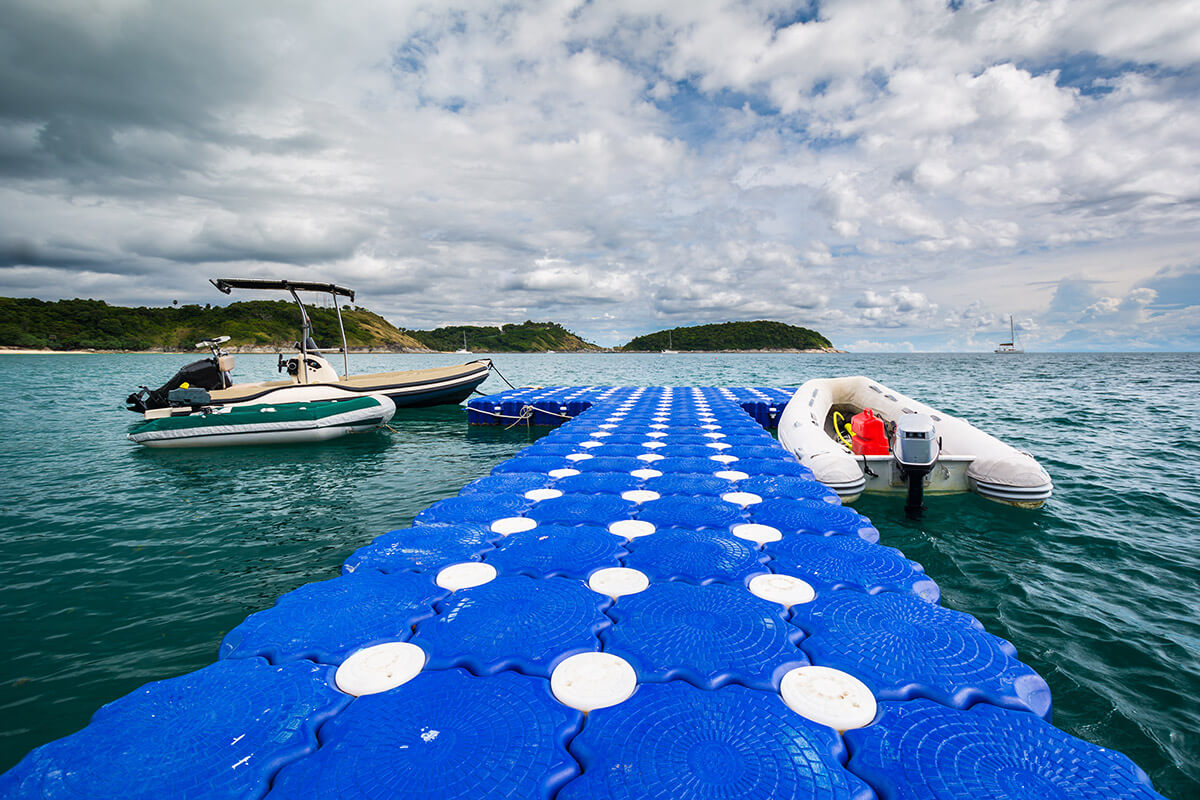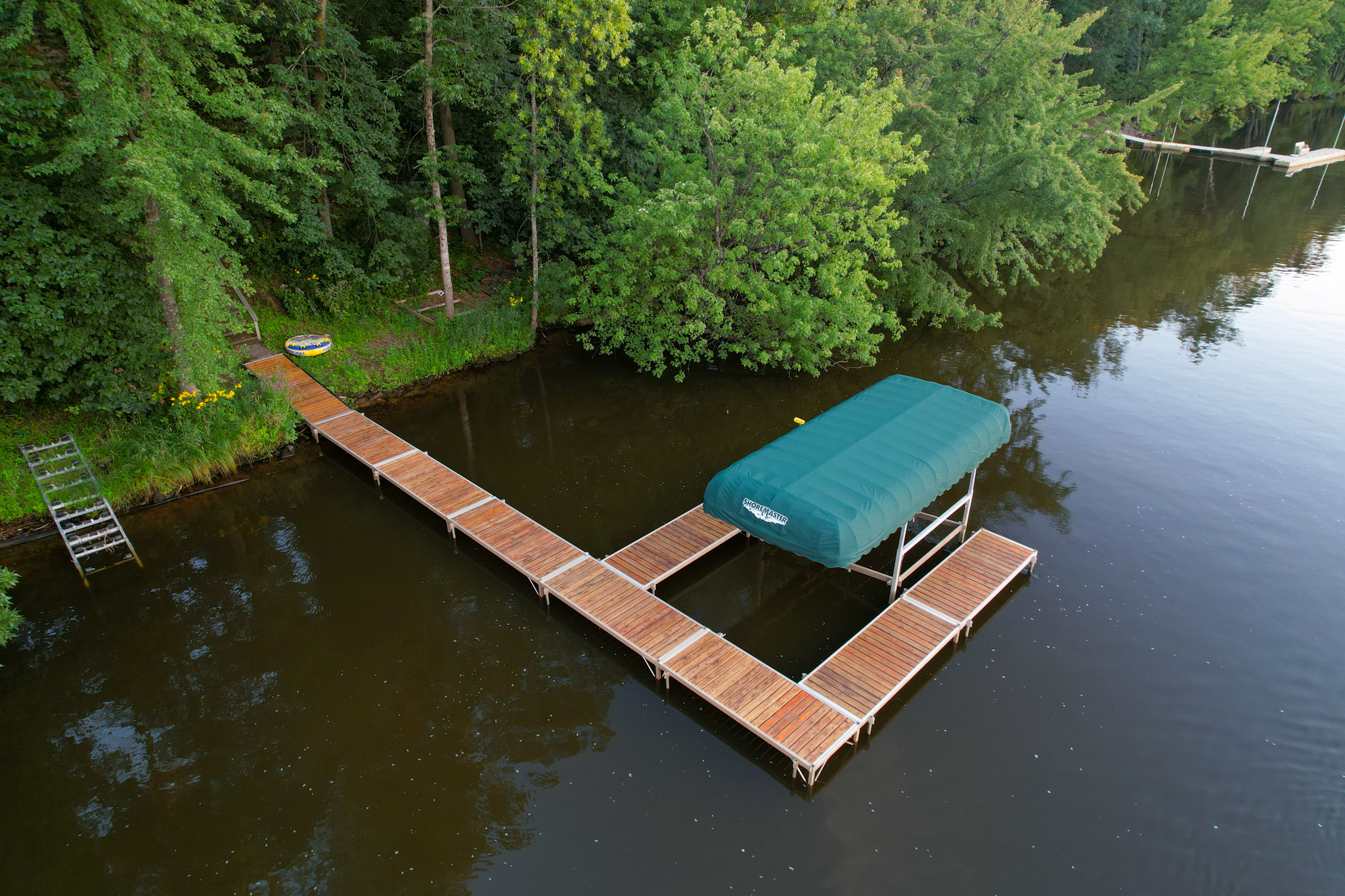Crafting Custom Solutions: Why a Floating Dock Builder is Essential for Special Requirements
Crafting Custom Solutions: Why a Floating Dock Builder is Essential for Special Requirements
Blog Article
Floating Docks: The Ideal Choice for Versatile Water Gain Access To
Floating docks existing an engaging solution for a variety of water access needs, supplying versatility that transcends traditional mooring alternatives. Their capacity to adjust to fluctuating water levels while guaranteeing stability and safety makes them especially helpful for both industrial and entertainment applications. The modular nature of floating docks facilitates personalization, providing to specific needs. However, the nuances of setup and maintenance, alongside the variety of applications, call for a closer exam to fully appreciate their potential advantages and ramifications for waterway access strategies.
Advantages of Floating Docks
Floating docks offer countless advantages that boost water accessibility for different applications. Their capacity to increase and drop with transforming water levels makes them specifically useful in settings with changing trends or seasonal variations. This adaptability makes sure that vessels can conveniently tie without worry for the water's deepness, offering a trustworthy platform for recreational, industrial, and commercial uses.
Furthermore, floating docks are typically created from resilient materials that withstand rust, making them ideal for lasting usage in aquatic settings. Their installment is normally much less intrusive than standard fixed docks, lowering the environmental effect and assisting in quicker implementation (floating dock services). This versatility permits for less complicated relocation or reconfiguration according to user demands or ecological changes
Safety is an additional crucial advantage; floating docks can provide steady access for people getting off or boarding from watercrafts and minimize the risk of accidents connected with unpredictable surface areas. They can be developed to accommodate a selection of accessories, such as cleats and fenders, boosting capability. Overall, floating docks stand for a reliable option for enhancing water access throughout diverse industries while promoting safety and security and ecological sustainability.

Kinds Of Floating Docks
Various kinds of floating docks deal with different needs and settings, each designed with details functions to enhance capability. One of the most common kinds include modular docks, which include interlocking areas that enable simple personalization and expansion. These docks are ideal for entertainment usage, as they can be customized to fit various boat dimensions and water problems.
An additional popular choice is the fixed floating dock, which continues to be anchored in location yet floats with altering water levels. dock company. This type is especially matched for areas with very little tidal changes, supplying secure gain access to for fishing or swimming. In addition, there are drive-on docks, which feature a sloped design that allows boats to quickly drive on and off, making them ideal for personal watercraft and smaller sized vessels
For industrial applications, sturdy floating docks are offered, constructed from strengthened products to withstand considerable lots and extreme marine atmospheres. Eco-friendly floating docks make use of lasting products and styles to decrease environmental effect, frequently including attributes like plants to support neighborhood wildlife. Comprehending the various kinds of floating docks ensures that individuals can select one of the most proper service for their particular requirements.
Installation Process Introduction
A successful installment of floating docks requires mindful planning and focus to information to make sure optimal efficiency and safety and security. The initial action includes examining the site problems, consisting of water deepness, present, and prospective obstacles. This evaluation informs the selection of the ideal dock products and layout customized to the specific atmosphere.
Next, obtaining essential authorizations is essential, as lots of jurisdictions have laws relating to building and construction on water bodies. When authorizations are protected, the setup can proceed. Begin by preparing the foundation, which may include anchoring systems or pilings tailored to the dock type and local conditions.
Adhering browse around this site to the foundation setup, construct the dock sections according to supplier specifications. Guarantee that all parts are firmly secured and straightened to endure environmental stresses. Setting the dock in the marked area, guaranteeing it is degree and stable.

Upkeep Tips and Finest Practices
After the installment process is full, recurring maintenance plays an important function in ensuring the durability and capability of click this floating docks. Normal examinations must be carried out to determine any signs of wear, damage, or deterioration - floating docks. Check for any kind of loosened fittings, fractures, or splitting up in the dock areas, as these can jeopardize architectural honesty
Cleaning up the dock is necessary to get rid of debris, algae, and other build-up that can impact its look and safety. Utilize a gentle pressure clean regularly to keep sanitation without triggering damages to the surface area. Additionally, using a safety sealer every few years can assist enhance durability and resist ecological wear.
Pay attention to the mooring lines and anchors, ensuring they are totally free and secure from rust. Change any kind of degraded elements quickly to prevent dangers. Seasonal changes might likewise be needed; during extreme weather conditions, strengthening the dock or repositioning can avoid damages.
Applications for Floating Docks
Floating docks offer a multitude of applications, satisfying both commercial and recreational demands. In leisure settings, they offer seamless access to rivers for activities such as boating, fishing, and swimming. Their adjustable nature allows for installment in differing water degrees, guaranteeing risk-free and secure access regardless of tidal fluctuations.
Readily, floating docks are vital for marinas and beachfront organizations. They help with the docking of vessels, enabling effective unloading and filling of items. Their modular layout enables simple development or reconfiguration to accommodate changing organization needs, making them perfect for boat services, excursion operations, or angling charters.
Furthermore, floating docks are used in environmental applications such as water research study and habitat remediation. They link can function as platforms for scientific studies, checking water high quality, or carrying out wildlife studies without troubling sensitive ecosystems.
In industrial contexts, floating docks are employed in building tasks, supplying access to hard-to-reach locations for tools and personnel. Their convenience, longevity, and very little effect on the setting make them an optimum option for a large range of applications, improving both functionality and access in different water-based settings.
Final Thought
In conclusion, floating docks represent an optimal service for diverse water gain access to requires, owing to their flexibility, longevity, and modular style. Floating docks serve as a useful possession for entertainment, business, and ecological tasks, ensuring reliable access to waterways and promoting lasting techniques in marine settings.
Floating docks present a compelling service for a range of water gain access to needs, providing flexibility that transcends traditional mooring options.Floating docks deal many benefits that improve water gain access to for different applications. In general, floating docks stand for a reliable option for boosting water accessibility throughout diverse industries while promoting safety and ecological sustainability.
An additional popular option is the stationary floating dock, which remains anchored in place but drifts with transforming water levels.In conclusion, floating docks represent an optimal remedy for varied water gain access to needs, owing to their adaptability, resilience, and modular design.
Report this page